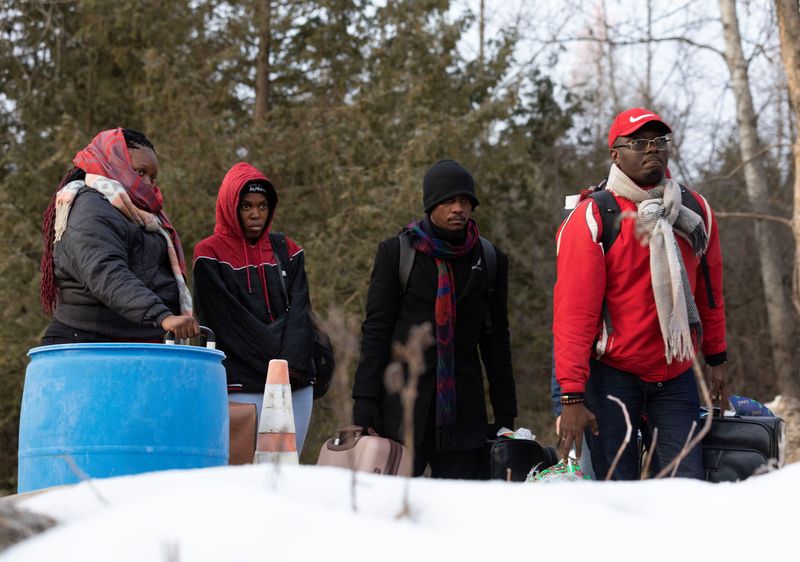By Christinne Muschi, Anna Mehler Paperny and Carlos Osorio
CHAMPLAIN, New York/TORONTO (Reuters) -Asylum seekers warned by police they could be sent back continued to walk into Canada through the unofficial United States border crossing into Quebec at Roxham Road a day after the two countries amended a 20-year-old asylum pact trying to stem the influx.
On Saturday afternoon, as snow began to fall at Roxham Road, a Canada Border Services Agency spokesperson said officials had just begun to process asylum seekers apprehended under the new protocol and had sent one back to the U.S.
U.S. President Joe Biden and Canadian Prime Minister Justin Trudeau announced changes to the Safe Third Country Agreement on Friday after a record number of asylum seekers arrived in Canada via unofficial border crossings, putting pressure on Trudeau to address it.
The Safe Third Country Agreement, signed in 2002 and which came into effect in 2004, originally meant asylum seekers crossing into either Canada or the United States at formal border crossings were turned back and told to apply for asylum in the first "safe" country they arrived in.
Now it applies to the entire 6,416-km (3,987-mile) land border. Under the revised pact, anyone who crosses into either country anywhere along the land border and who applies for asylum within 14 days will be turned back.
Roxham Road, which had become a notorious unofficial crossing for asylum seekers into Canada, closed at midnight on Saturday. But dozens crossed anyway, including one group with a baby and a toddler just after midnight. Police took them into custody, warning them they could be turned around.
Police unveiled a new sign near the dirt path linking New York State with the province of Quebec, informing people they could be arrested and returned to the United States if they crossed.
The Canada Border Services Agency (CBSA), which polices ports of entry, and the Royal Canadian Mounted Police (RCMP), which polices the rest of the border, referred questions about enforcement to Immigration, Refugees and Citizenship Canada, a federal government department.
The department referred questions about enforcement back to the CBSA and RCMP, saying in a statement the two bodies will "work together to uphold Canada’s border integrity."
Quebec RCMP did not immediately respond on Saturday morning to questions about what will happen to people intercepted at Roxham Road.
A 30-year-old man from Pakistan, who did not want to be identified, said he had taken a taxi from New York City.
"I don’t have anywhere to go," he said.
He crossed into Canada.
Confusion reigned at a bus station early on Saturday, where about 25 people from Venezuela, Haiti, Ecuador and Peru milled about, wondering what to do next. One told Reuters he had heard about the new rules on the bus; another had heard on arrival.
The new deal's stated aim is to promote orderly migration and ease pressure on communities overwhelmed by a spike in asylum seekers who crossed at places like Roxham Road to avoid being turned back at official entry points.
But enforcing the amended agreement by apprehending people who cross anywhere along the land border could be a logistical nightmare and put people at risk, critics say.
If the purpose of this change is to deter irregular crossings, said University of Toronto law professor Audrey Macklin, "it will simply fail."
When asylum seekers crossed at Roxham Road they wanted to be caught by authorities because they knew that was the way to file refugee claims. If the incentive becomes evasion, critics fear, people will be driven underground and toward riskier modes of travel. They will want to sneak into the country and hide for two weeks before claiming refugee status.

"This will divert people into more dangerous, more risky, more clandestine modes of entry across 6,000 kilometres of border," Macklin said.
"That’s just a job-creation program for smugglers."